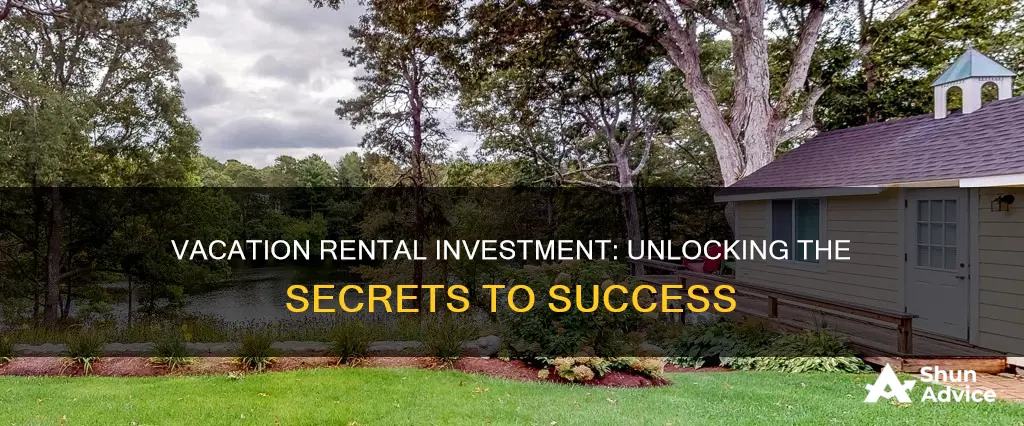
Investing in a vacation rental property is a potentially lucrative business decision, but it requires careful consideration and research. It is important to understand the challenges and differences between investing in a vacation rental property and traditional real estate investing.
Vacation rental properties offer higher profit margins and more room for growth and scaling. However, they also come with unique challenges, such as managing the property, marketing it to find guests, and inconsistent income due to seasonality.
Before investing in a vacation rental property, it is crucial to conduct thorough research, use analytical software tools, create a business plan, and decide on a financing strategy.
What You'll Learn

Understand the financial responsibilities
Understanding the financial responsibilities is a crucial aspect of investing in a vacation rental property. Here are some key points to consider:
Initial Investment and Down Payment
When purchasing a vacation rental property, you will need to have a substantial amount of capital for the initial investment. The down payment required for a vacation rental property is typically higher than that of a primary residence. It is common for lenders to require a down payment of 10% to 25% or even up to 60% in some cases. This higher down payment is due to the increased financial burden and risk associated with a second property.
Monthly Expenses and Operating Costs
Owning a vacation rental comes with various monthly expenses and operating costs. These include mortgage payments, property taxes, insurance, utilities, and maintenance. It is important to calculate and prepare for these ongoing costs, which can be significant. Maintenance and upkeep can be particularly costly, and it is recommended to set aside around 1% of the property's value each year for repairs and maintenance.
Short-Term vs. Long-Term Rental Income
Vacation rental properties are typically considered short-term rentals, which can affect your income stream. Unlike long-term rentals, which provide a more stable and consistent income, short-term rentals offer higher profit margins and more room for growth. However, they also come with the challenge of managing higher vacancy rates and fluctuating demand throughout the year.
Seasonal Fluctuations and Occupancy Rates
The income generated from a vacation rental property is heavily influenced by seasonality. For example, a property near a beach or lake will be more popular during the summer, while a ski resort will be in higher demand during winter. It is important to understand the occupancy rates and demand patterns throughout the year to maximize your rental income.
Management and Marketing Strategies
You will need to decide whether to manage the property yourself or hire a property management company. Self-management requires a significant time investment and a broad range of skills, from maintenance to marketing. On the other hand, hiring a property management company can be costly, with fees ranging from 8% to 15% of the rental income. Marketing your vacation rental effectively is also crucial to ensuring a steady stream of guests and bookings. Utilizing social media platforms and creating a dedicated website can help increase visibility and attract potential renters.
Tax Implications and Deductions
Understanding the tax implications of owning a vacation rental property is essential. In many cases, you can write off various expenses, such as mortgage interest, property taxes, and rental income, especially if you rent out the property for more than a certain number of days per year. Consulting a certified public accountant (CPA) or tax specialist can help you navigate the tax codes and deductions specific to your situation and location.
Inheriting Wealth: How to Invest
You may want to see also

Research the location
The location of your vacation rental property is one of the most important factors in determining its value and potential profitability. Here are some key things to consider when researching the location for your vacation rental investment:
Type of Location
Decide on the type of location that you want for your vacation rental property. Do you want to buy a property in a city, a town, or a rural area? Each option will have different demand dynamics and popularity depending on the time of year. For example, a property near a lake or beach will likely be more popular during the summer, while a property near a ski resort will be in higher demand during the winter.
Vacation Rental Demand
Once you have identified potential locations, research the vacation rental demand in those areas. This is different from residential demand, so consider factors such as nearby attractions, access to transportation, and overall traffic and popularity of the area. Is it a year-round destination or does it only get busy at certain times of the year? These factors will influence the demand for vacation rentals in the area.
High and Low Seasons
As mentioned earlier, the income generated from vacation rental properties is highly dependent on seasonality. In addition to considering the location type and demand, look at the historical occupancy rates for the area during different times of the year. This will help you understand when the high and low seasons are, and how that might impact your potential income.
Competition and Attractions
Research the competition in the area and the types of attractions and amenities they offer. Are there multiple rental properties in the area, or is it more of a niche market? What attractions and amenities are available nearby that would appeal to potential guests? Consider the views, proximity to beaches or ski resorts, nearby hiking trails, dining options, and entertainment venues.
Local Regulations
Don't forget to look into the local regulations for short-term rentals in the locations you are considering. Some areas may have restrictions or specific requirements that you need to be aware of before investing in a vacation rental property.
Retirement Investment Options: Exploring the Best Paths for Your Golden Years
You may want to see also

Weigh the pros and cons
Weighing the pros and cons is an important step in the process of buying a vacation rental investment. Here are some key points to consider:
Pros:
- Income generation: Vacation rentals can provide a good source of income, especially in popular tourist areas. The ability to adjust rates during high seasons and on weekends further increases earning potential.
- Holiday home for personal use: Investing in a vacation rental provides you with your own holiday home that you can use anytime. This can be ideal for special events, annual holidays, or personal getaways.
- Tax benefits: If you rent out your vacation home for a certain number of days per year, it is considered a business, and you can write off various expenses as tax-exempt. These may include mortgage interest, property taxes, rental income, insurance premiums, and more. It is recommended to consult a tax professional to understand the specific tax implications.
- Appreciation and fixed investment: Over time, the value of your investment property is likely to increase, providing the option to sell it later for a profit or keep it as a retirement home.
- Recession-friendly: Historical data suggests that even during economic downturns, people continue to take vacations but opt for shorter trips and share expenses. Therefore, a vacation rental can still generate income during a recession.
Cons:
- Property management: Renting out a holiday home requires more management compared to traditional renting. You need to oversee cleaning, maintenance, guest communication, check-ins, and checkouts. This can become overwhelming if you own multiple properties. Hiring a property management company can help but will incur additional costs.
- Expenses: There are numerous costs associated with owning and managing a vacation rental, including listing fees, property management fees, cleaning costs, maintenance, and restocking supplies. These expenses can quickly add up, especially during the low season when bookings may be fewer.
- Marketing: Simply listing your rental property on platforms is often not enough. You also need to actively market it through social media and other channels to attract guests and stay competitive.
- Inconsistent income: Vacation rentals typically have high and low seasons, resulting in inconsistent income throughout the year. It is essential to be aware of this seasonality and maximize earnings during the high season.
- Time commitment: As a vacation rental owner, you will need to invest time in managing the property, especially if you choose to handle everything yourself without a property management company.
- Regulations and restrictions: Some cities and HOAs have regulations and restrictions on short-term vacation rentals, which you must consider before investing.
- Financing: Vacation rental properties often require larger down payments and higher interest rates compared to traditional mortgages.
- Competition: As the popularity of vacation rentals grows, you may face increasing competition from other rental properties in your area.
Carefully considering these pros and cons will help you make an informed decision about investing in a vacation rental property.
Shiba Inu: Invest or Avoid?
You may want to see also

Know the legal requirements
Before buying a vacation rental property, it is important to familiarize yourself with the legal requirements of owning and renting out a property. Here are some key legal considerations to keep in mind:
- Zoning laws and regulations: Familiarize yourself with the zoning laws and regulations in the area you plan to invest in. Some areas may have restrictions on short-term rentals or specific requirements for vacation rental properties. Understanding these regulations will help you avoid legal issues and ensure your property is in compliance.
- Licensing and permits: Depending on the location, you may need to obtain special licenses or permits to operate a vacation rental business. Research the requirements in your desired location and take the necessary steps to obtain the required licenses and permits.
- Tax obligations: Understand the tax implications of owning a vacation rental property. Consult with a tax professional or accountant to ensure you are complying with all relevant tax laws and taking advantage of any applicable tax deductions or benefits.
- Landlord-tenant laws: As a rental property owner, you need to be aware of the rights and obligations of both tenants and landlords. These laws cover a range of topics, including security deposits, lease requirements, eviction rules, and fair housing laws. Educate yourself on these laws to avoid legal issues and ensure a positive relationship with your tenants.
- Insurance requirements: Protect your investment by obtaining the necessary insurance coverage. In addition to homeowners insurance, consider obtaining landlord insurance, which can cover property damage, lost rental income, and liability protection in the event of an accident or injury on your property.
- Contractual agreements: When renting out your vacation property, it is essential to have well-drafted rental agreements or leases in place. Consult with a legal professional to ensure your contracts are comprehensive and compliant with local laws.
- Health and safety regulations: Adhere to all health and safety regulations, such as those related to fire safety, carbon monoxide detectors, and minimum housing standards. These regulations may vary by location, so be sure to research the specific requirements for your area.
- Local regulations: Keep yourself informed about any local regulations or ordinances that may impact your vacation rental business. These could include noise ordinances, parking restrictions, or waste management requirements.
By understanding and complying with the legal requirements, you can help ensure a successful and stress-free experience as a vacation rental property owner. It is always a good idea to consult with legal and tax professionals who can provide you with specific advice and guidance based on your unique situation and location.
Betting on a Bear Market: Navigating Investment Strategies During Economic Downturns
You may want to see also

Plan your management strategy
Planning your management strategy is a crucial step in the process of buying a vacation rental investment. Here are some key considerations and steps to help you develop an effective management plan:
Identify Your Target Guest
Firstly, identify your target guest by considering the features of your property. Ask yourself: is it located near a beach or in a bustling city? Is it an apartment or a house? By understanding your target guest, you can tailor your marketing and amenities to their needs and preferences.
Choose a Management Approach
Decide whether you will manage the property yourself or hire a property management company. Self-management can be time-consuming, especially if you have multiple properties, but it gives you greater control. On the other hand, hiring a property management company can be costly but can take care of various tasks, including maintenance, guest check-ins and check-outs, and responding to guest messages.
Develop a Marketing Strategy
Create a comprehensive marketing strategy to promote your vacation rental. Utilise social media platforms such as Facebook, Instagram, and Pinterest to create business pages and share content such as videos, slideshows, and property walk-throughs. Update your listings regularly to improve your SEO and increase visibility.
Implement Automation Tools
Consider using vacation rental software or automation tools to streamline your management tasks. These tools can help you manage multiple accounts and listings, track guest support, organise messages, create dynamic pricing, automate guest reviews, and manage direct bookings.
Monitor Competition
Keep a close eye on your competitors' pricing, cleaning fees, special packages, and marketing strategies. This will help you ensure that your offering is in line with the market and that you are not missing out on potential reservations.
Build Your Own Website
In addition to listing your property on multiple platforms, consider creating your own website. This will help formalise your business and provide a dedicated space for potential guests to find information, photos, and links to your social media channels.
The Great Debate: Buying vs Renting — Which is the Smarter Investment Strategy?
You may want to see also







